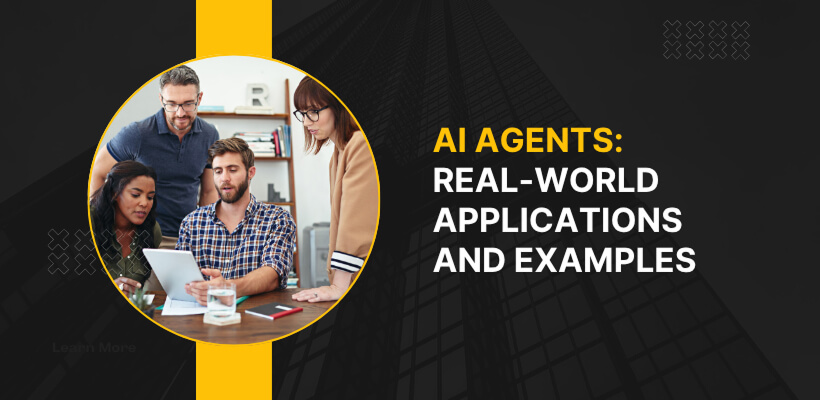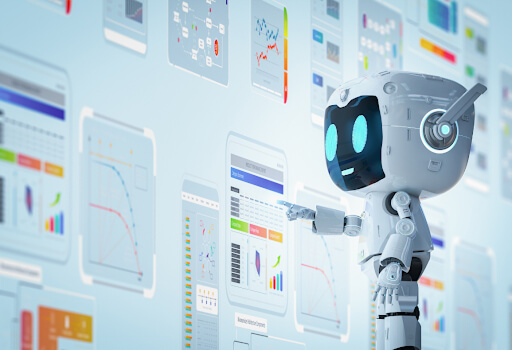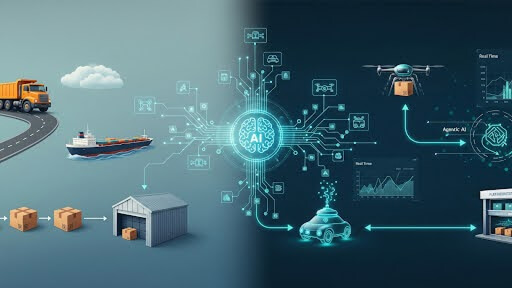The current technological landscape is characterized by the widespread adoption of Large Language Models (LLMs), which have democratized complex tasks such as content generation, coding, and information synthesis.
However, LLMs are fundamentally reactive; they only act when prompted by a human.
The next evolutionary step in artificial intelligence, AI agents, represents a profound shift from this reactive model to a proactive, goal-oriented paradigm.
By combining the reasoning capabilities of LLMs with structured components for planning, memory, and tool use, AI agents are moving the industry toward truly autonomous systems that can execute multi-step workflows without constant human supervision.
In this blog, we’ll explore the examples of AI agents and their real-world impact across industries.
What are AI Agents?
An AI agent is an intelligent software entity that perceives its surroundings, processes data, and takes action to accomplish defined objectives.
These agents are powered by machine learning, natural language processing (NLP), and automation technologies, enabling them to operate independently or assist humans in decision-making.
Unlike simple chatbots or traditional automation, agents can independently make decisions, execute complex plans, and adapt to new situations, whereas chatbots typically follow predefined scripts and respond only to direct input.
- Autonomy: The ability to initiate decisions and execute complex tasks independently, requiring little to no human intervention.
- Planning: The capacity to break down a high-level goal (e.g., “launch a new product campaign”) into a detailed, executable series of sub-tasks, and to adjust that plan dynamically if circumstances change.
- Memory and Context: They maintain long-term and short-term memory, allowing them to learn from past interactions, maintain context across long workflows, and self-refine their behavior over time.
- Tool Use: Agents can interact with the external world by invoking external tools, such as browsing the internet for up-to-date data, connecting to databases, or using connected APIs to send emails, update CRM systems, or execute financial trades.
Together, these features enable AI agent examples that go beyond simple automation, acting as dynamic, intelligent collaborators.
Why AI Agents are the Next Big Thing
AI agents are seen as the next breakthrough after LLMs because they address the limitations of static models. LLMs, while powerful, struggle with tasks needing current information or guaranteed factual accuracy, leading to hallucinations.
AI agents address these LLM challenges by making artificial intelligence a proactive collaborator rather than just a generator. This is crucial for solving real-world business issues and is the core reason why AI agents are seen as the next big thing.
Here’s why businesses are paying attention to the growing applications of AI agents:
- Overcoming Static Knowledge: With search or web-browsing tools, agents access real-time data, keeping actions and recommendations current and accurate.
- Multistep Reliability: Agents plan, execute, and self-correct across applications, delivering complex outcomes instead of static answers.
- Dynamic Adaptability: Unlike rule-based automation, which fails in changing conditions, AI agents interpret new environments (such as supply chain disruptions) and quickly adapt their strategies.
- End-to-end execution: They can plan, act, and self-correct through an entire process.
Real-World Applications and Examples of AI Agents
From powering your smart home devices to optimizing logistics operations, AI agents are everywhere. With their broad impact, let’s explore some of the most significant real-world applications and examples of AI agents across industries.
1. Customer Service and Virtual Assistants
By offering 24/7 support, instant query resolution, and personalized interactions, AI agents have revolutionized the customer service industry by improving efficiency and customer satisfaction.
Examples:
- In customer experience, AI agent examples such as ChatGPT, Google Assistant, Siri, and Amazon Alexa act as conversational AI agents, capable of answering questions, executing commands, and automating tasks.
2. Healthcare and Medical Diagnosis
AI agents in healthcare are assisting doctors in making faster and more accurate diagnoses. They also manage patient data and even predict disease outbreaks.
Examples:
- Google DeepMind’s AI agent helps detect eye diseases and predict acute kidney injuries before they occur.
- Virtual nursing assistants, such as Sensely, provide round-the-clock patient engagement and monitoring.
3. Finance and Banking
The financial industry has been an early adopter of AI agents due to their potential to improve efficiency, reduce fraud, and enhance customer experience.
Examples:
- Robo-advisors, such as Betterment and Wealthfront, utilize AI agents to provide personalized investment advice and portfolio management.
- Fraud detection agents monitor transactions in real time, flagging suspicious activities.
- Customer engagement agents, such as Erica from Bank of America, help customers manage accounts, pay bills, and track spending through conversational AI.
4. E-commerce and Retail
In e-commerce, AI agents play a crucial role in personalizing shopping experiences, optimizing inventory, and streamlining customer journeys.
Examples:
- Amazon’s recommendation engine acts as a utility-based AI agent, analyzing user behavior to suggest products.
- Dynamic pricing agents adjust prices in real time based on demand, competitor pricing, and customer behavior.
5. Manufacturing and Industry 4.0
AI agents in manufacturing play a crucial role in predictive maintenance, quality control, and supply chain optimization.
Examples:
- Collaborative robots (cobots) equipped with AI capabilities assist human workers in assembly lines and logistics.
- AI agents in supply chain management optimize routes and inventory levels to minimize costs and expenses.
6. Autonomous Vehicles and Transportation
Autonomous vehicles rely heavily on AI agents that can perceive surroundings, make split-second decisions, and ensure safety.
Examples:
- Tesla’s Autopilot, Waymo, and Cruise use advanced AI agents to process sensor data, recognize obstacles, and navigate traffic.
- AI traffic management agents in smart cities optimize traffic flow and reduce congestion by analyzing real-time data.
Benefits of using AI Agents
The deployment of AI Agents yields quantifiable business benefits that extend far beyond the efficiency gains of earlier automation tools. They offer a significant Return on Investment (ROI) by driving both cost reduction and strategic revenue growth.
- Increased Productivity and Scalability: Agents operate 24/7 without fatigue, simultaneously managing vast volumes of complex tasks. This increased throughput enables organizations to scale their operations without a corresponding increase in human capital.
- Superior Decision-Making: Agents process and synthesize data from multiple sources at unparalleled speeds, making objective, data-driven decisions in real-time. This leads to better and faster organizational responsiveness to market volatility and business opportunities.
- High Financial ROI: Agentic AI consistently outperforms traditional rule-based automation in long-term ROI. While traditional methods may hit a performance ceiling, the continuous learning and self-improving nature of AI agents create compounding returns.
- Strategic Focus: By offloading high-volume, cognitively repetitive work, AI Agents free up human employees to focus on high-value tasks that require creativity, emotional intelligence, and strategic oversight, leading to higher employee engagement and innovation.
Conclusion
AI agents have rapidly transitioned from futuristic concepts to indispensable business assets. Whether diagnosing diseases, managing investments, or personalizing customer journeys, their impact is visible across every sector.
As AI agents continue to evolve with advances in generative AI, deep learning, and automation, they’ll redefine how we live, work, and interact with technology. The key lies in using them responsibly, ensuring transparency, and harnessing their power to drive meaningful, human-centered innovation. By embracing this opportunity with purpose and care, we can shape a future where AI amplifies human potential and drives positive change.
FAQs
1. What are AI agents?
AI agents are intelligent systems that perceive their environment, process data, and take actions autonomously to achieve specific goals.
2. Which industries use AI agents the most?
AI agents are widely used in healthcare, finance, E-commerce, manufacturing, and customer service.
3. What technologies power AI agents?
AI agents rely on machine learning, natural language processing (NLP), computer vision, and automation frameworks to function intelligently.
4. Do AI agents need continuous training?
Yes. Regular training with updated data enables AI agents to improve accuracy, adapt to changes, and make more informed decisions over time.
5. What is the future of AI agents?
Future AI agents will be more autonomous, collaborative, and capable of reasoning, acting as true digital teammates across industries.
How Can [x]cube LABS Help?
At [x]cube LABS, we craft intelligent AI agents, including chatbots in healthcare, that seamlessly integrate with your systems, enhancing efficiency and innovation:
- Intelligent Virtual Assistants: Deploy AI-driven chatbots and voice assistants for 24/7 personalized customer support, streamlining service and reducing call center volume.
- RPA Agents for Process Automation: Automate repetitive tasks like invoicing and compliance checks, minimizing errors and boosting operational efficiency.
- Predictive Analytics & Decision-Making Agents: Utilize machine learning to forecast demand, optimize inventory, and provide real-time strategic insights.
- Supply Chain & Logistics Multi-Agent Systems: Enhance supply chain efficiency by leveraging autonomous agents that manage inventory and dynamically adapt logistics operations.
- Autonomous Cybersecurity Agents: Enhance security by autonomously detecting anomalies, responding to threats, and enforcing policies in real-time.
- Generative AI & Content Creation Agents: Accelerate content production with AI-generated descriptions, visuals, and code, ensuring brand consistency and scalability.
Integrate our Agentic AI solutions to automate tasks, derive actionable insights, and deliver superior customer experiences effortlessly within your existing workflows.
For more information and to schedule a FREE demo, check out all our ready-to-deploy agents here.
 1-800-805-5783
1-800-805-5783 


